This article generously contributed by www.YourPrepperHalf.com
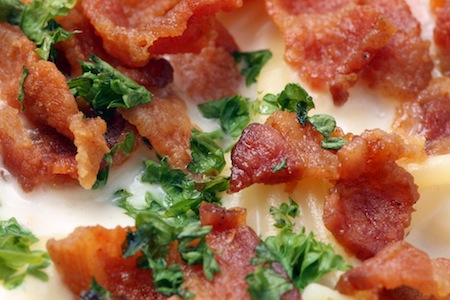
If you are a survivalist and a hunter, you know that wild game may be what feeds you and your family when times get hard. As a hunter myself, I know what it takes to kill and dress both small and large game; nothing like a venison roast is there?
But in order to make the most out of a kill, we must try to use the entire animal. Most people have probably never tried to make their own bacon; it’s far better than store bought.
Curing your own bacon from scratch is fun and not as difficult as you might think. You’ll need a whole animal belly; I am using a domestic organic pork belly for this recipe. Your butcher will probably have to order you one as they are rarely found on supermarket shelves.
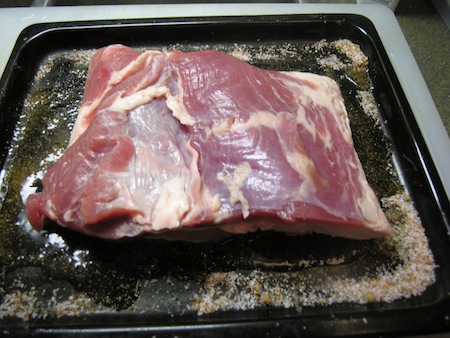
You’ll also need a few easy-to-obtain ingredients and a smoker/BBQ capable of smoking at between 150°-200°F. In a SHTF situation, a smoker might not be the best idea so you can leave that off if desired.
Homemade Bacon
Time. 2 hours prep, seven days of curing, 1.5 2 hours of smoking.
Ingredients
- 5 pounds of animal belly
- Kosher salt
- Pink curing salt*
- Brown sugar
- 7 1/2 teaspoons ground black pepper
- 1 cup maple syrup
- ½ lb coffee
- ¼ cup liquid smoke – optional
* You can buy curing salt at http://www.butcher-packer.com
Basic dry-cure is a mix of kosher salt, sugar and pink salt. Pink in this case refers to curing salt, which is regular table salt with 6.25% sodium nitrite added which dyed pink for safety. This is a component you can’t leave out. The smoking method holds the meat near the so-called “danger zone” for several hours and the nitrites prevent bacteria from growing.
To make the basic dry-cure mix, use the following:
- 1 lb kosher salt
- 8 oz sugar
- 10 teaspoons pink curing slat
You need about 1/4 cup of the dry-cure mix for this recipe.
Curing salt…what is that? Curing salt is a salt mixture containing sodium nitrate. But what you may not know is that not only are the fears over nitrates totally exaggerated, but “nitrate-free” products can in fact contain many times more nitrates than traditional products.
Sodium nitrate is a type of salt that happens to be a exceptionally effective food preservative; it’s been used for decades. A biologically occurring mineral, sodium nitrate is present in all kinds of vegetables (root veggies like carrots as well as leafy greens like lettuce) along with all types of fruits. Essentially, anything that grows in the ground draws sodium nitrate out of the soil.
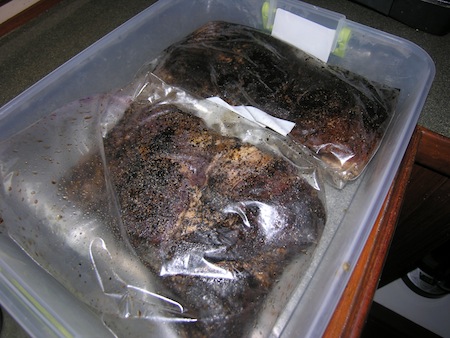
One thing that happens when sodium nitrate is used as a curing agent is that the sodium nitrate is converted to sodium nitrite. It’s sodium nitrite that actually contains the properties that make it a good preservative. Interestingly, the sodium nitrate that we consume through fruits and, vegetables is transformed to sodium nitrite by our digestive process. So when we eat fruits and vegetables our bodies produce sodium nitrite.
Preparation
- If the skin is still on your belly, remove it. I like to cure the skin as well while making bacon to be used later for seasoning meat. If your belly still has the hair on it, you can either burn it off at this time or just not use it.
- Spread about 1/8 cup of the dry-cure mix out on a pan and dredge one side of the belly in it until you have a nice even outside coat . Pour on the other 1/8 cup of the mix and do the same to the other side and the edges. Rub it in real good with your hands.
- If you prefer to use liquid smoke instead of smoking on a grill, now is the time to spread some on. (Eliminate step 8).
- Drizzle on your syrup in an even coat and then sprinkle with black pepper.
- Sprinkle on the coffee grounds afterwards.
- Place belly into a plastic bag and place in a pan to catch any leaks. Place in the refrigerator for at least 7 days. If the belly is thicker than 2″ add another couple of days. A few more days won’t hurt anything. The belly will release liquid so every day or two open the bag and drain the liquid. Then you want to gently rub the bag so the spices are well distributed, and flip the bag over.
- After 7 or so days, remove the belly from the bag, throw the liquid away, and rinse the belly with cool water removing the curing salt from the surface. Pat dry.
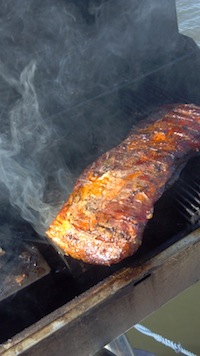
- If you are using a grill, set up with low heat for smoking. If possible, smoke over indirect low heat until the bacon’s internal temp is 150°F, about 1.5 to 2 hours. You can use any hardwood you like. Hickory is the favorite for me but apple or mesquite will work too.
- When done, let it cool on a plate in the fridge. Cold bacon is easier to slice. Use a long thin knife to slice it.
- Wrap it tightly with a vacuum sealed Ziplock bag, and refrigerate for up to 2 weeks or freeze for months.
This article generously contributed by www.YourPrepperHalf.com

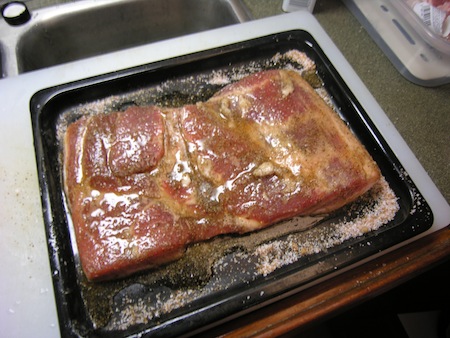
Very helpful. My son was just saying he’d like to try doing some bacon and already has a nice smoker. And that bit about the nitrate/nitrite was extremely interesting. Did not know that. Thanks for posting.
I wanted to simply ask “why the coffee grounds”?
Overall I think this is a wonderful article and can’t wait to try out the recipe.
Thank you!
I am the author of the article.
The coffee grounds give the finished product a hint of bitterness; when you eat the bacon, you will taste all of the flavors.